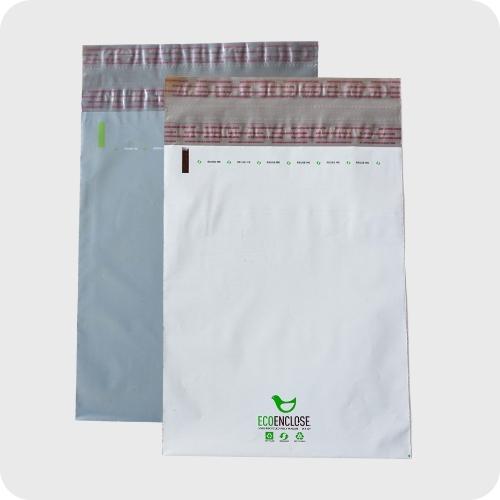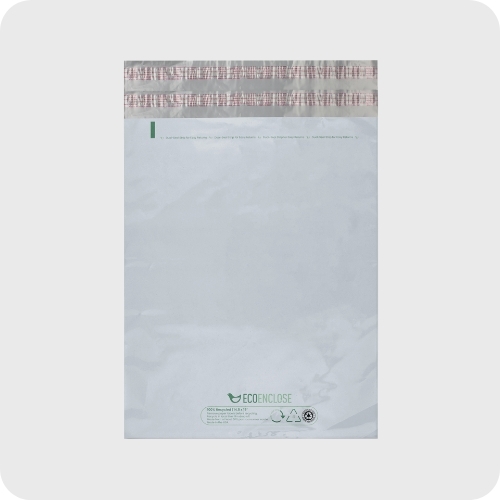RCS100-CERTIFIED MAILERS
Our latest product launch and a guide to recycled content certifications for poly film
Shop RCS100-Certified Poly Mailers
What is RCS100 Certification?
The Recycled Claim Standard has two branches: RCS100 and RCS Blend. RCS100 certification is for products made from 100% recycled content with additives at or below 5% of the product’s total weight. RCS Blend certification is for levels of recycled content less than 95%.
Why is This Certification Exciting?
The Importance of Domestic Manufacturing
Should I Choose RCS100-Certified Poly Mailers?
Why do two 100% recycled poly mailers look and feel so different?
Dive Deeper: Common Questions Answered
How do RCS100-certified mailers differ from our standard stock poly mailers?
While the functional plastic resin in both mailer options is made from 100% recycled content, the amount of additives in each differs.
Here’s a high-level breakdown of these mailer options:
100% Recycled Poly Mailers
50% PCR (post-consumer resin)
RCS100-Certified Poly Mailers
56% PCR (post-consumer resin)
Why the focus on additives?
As EcoEnclose sought to bring the first on-package certified poly mailer to market, we decided to pursue the Recycled Claim Standard, a scheme developed and owned by the Textile Exchange because of the organization’s history of bringing transparency, guidance, and circularity to the apparel industry for over 20 years.
Their Recycled Claim Standard scheme allows RCS100 to be used on products and packaging that have (1) 100% recycled content in functional inputs and (2) additives that represent up to 5% of the product’s total weight. RCS Blend will be used if less than 100% of the functional inputs are made from recycled content or if additives represent more than 5% of the product by weight.
Read More: Recycled Claim Standard: RCS100 (Textile Exchange)
As EcoEnclose pursued RCS100 certification, we continuously refined our film blend to reduce additives to below 5% of the material by weight.
Are RCS100-certified mailers better and more circular?
We don’t believe that RCS100-certified mailers are significantly or ecologically superior to our standard 100% recycled poly mailers.
We see the most essential criteria in our product development to be boosting circularity by:
- Using maximum amounts of recycled content, with an emphasis on maximum levels of post-consumer waste
- Manufacturing with domestic recycled content, fueling local investments in recycling, sorting, and remanufacturing
- Designing for ready recyclability
- Catalyzing the market adoption of novel, regenerative, low/negative carbon materials
Brands considering our RCS100-certified poly mailer versus our standard 100% recycled poly mailer should feel confident that either option is a significant sustainability step forward.
While our RCS100-certified poly mailers use slightly more post-consumer waste and recycled content overall than our standard 100% recycled poly mailers, both are produced domestically, are thin film recyclable, and use very high levels of recycled content and locally derived post-consumer waste.
The production and use of the lower additives in the RCS100-certified poly mailers may lead to slightly more waste in the manufacturing and converting process - offsetting the benefits of the slight increase in its higher recycled content. Read more in the next section about how various additive levels impact film quality and, consequently, speed, waste, and efficiency during manufacturing.
RCS100-certified mailers offer a third-party verification by the Textile Exchange - a reputable leader in supply chain sustainability - which is not the case for our standard poly mailers. We’ve also found that many brands prefer using packaging materials certified to the same standards as their products. The Textile Exchange’s schemes (RCS and GRS) are ideal for apparel brands.
Additionally, as we continue to see packaging regulations passed, many brands seek third-party verification across their entire supply chain. Leaning on certified packaging is one way to reduce the risk and workload involved in auditing manufacturing partners.
What are additives? Are they problematic?
To make a poly mailer, first, you must create a custom plastic blend, extrude it into film, and then convert it into individual mailers.
In addition to the plastic resin, other components help make a poly mailer a functional product. Some of these “ingredients” are visible,– like sealing strips, release liners, printing ink, and adhesives.
Other less-obvious ingredients are also present in the mailer’s makeup, included during the creation of custom film blends and broadly called additives. Additives are synthetic materials that add functional and aesthetic improvements to the film. Common additives in LDPE plastic films include colorants, TiO2 to improve color and opacity, anti-blocking agents, and anti-static additions. These additives are essential to successfully extruding films, effectively converting them, and yielding a film with solid, strong print quality, flexibility, and more.
An RCS100-certified poly mailer is one whose film has, at the maximum, 5% additives by weight - meaning the amount of functional resin in the film is 95% by weight.
Across the market, other (non-RCS100 certified) 100% recycled film blends typically have additives that represent up to and even over 20% of the weight of the finished film. Therefore, while the percent of recycled content in the functional plastic can stay the same between two film blends, the amount of additives can differ significantly depending on the engineering of each.
We typically want to reduce “additives” in food or personal care products, but additives aren’t problematic in the same way when it comes to film! Additives help brands make bags more functional and usable. They ensure extruding, printing, and converting equipment can operate efficiently and smoothly. They can reduce waste across the manufacturing process.
On the other hand, in some instances, high levels of additives could lead to such an increase in the density of film that the material may no longer be able to pass a float-sink test (meaning it may not be able to be recycled back into a plastic film). This is not the case with our standard poly mailers, which were validated as recyclable by NexTrex and How2Recycle.
Because of the various functional benefits of additives, restricting them to no more than 5% of the film’s weight can be challenging. We are proud of the RCS100-certified mailers we’ve developed. They are highly functional and will work beautifully for most brands. However, we also recognize that the reduced additives have led to a mailer with more aesthetic inconsistencies and coloring that may not meet all brands’ aesthetic needs or standards.
Measuring recycled content with mass balance and functional material.
The most commonplace method of measuring recycled content is the functional material method.
Over the past decade, recycled content and post-consumer waste have become a critical input for boosting product circularity and an important sustainability metric.
Recycled content labeling has generally been based on the recycled content of a product's primary material—the “functional material.”
This is still how most recycled content labeling is measured and communicated.
For example, suppose the plastic resin used to make a poly mailer has 100% recycled content. In that case, the mailer is generally labeled as “100% Recycled” despite the additives, adhesives, and ink added to the film and final product, which may not be made from recycled content.
The same is true for a corrugated shipping box: the paper fibers can be 100% recycled content, while the bonding agents, inks, adhesives, and other additions that create the finished product are not. However, we (and many certification schemes, including FSC) would still consider and label this as a 100% recycled box.
When you see “100% Recycled” today, this labeling almost always refers to the level of recycled content in the functional base material that makes up the product. This broad recycled content percentage can comprise post-consumer waste (PCW/PCR), post-industrial waste (PIW, also called pre-consumer waste), or both.
The FTC Green Guides have historically allowed for unqualified claims related to recycled content and recyclability, stating that “incidental additions” do not have to be factored into recycled content claims. This has generally been left to interpretation, leading brands and packaging providers to use the functional material approach described above.
Some certification schemes take a different approach, which we’ll refer to as mass balance.
While the functional material approach focuses on the amount of recycled content in a product's primary substrate, the mass balance approach includes all manufacturing additives to measure the overall recycled content percentage.
Mass balance calculations are completed by:
- Measuring the total weight of all of the inputs (A)
- Measuring the total weight of recycled content among all inputs (B)
- Dividing the total recycled content by the total weight of manufactured material
- (B/A)*100 = mass balance total recycled content
Note: certifications that use the mass balance approach do not consider additional components added to the product during and after the material is converted into a package, such as adhesives, printing inks, or sealing strips. Given the increased scrutiny in this space, this may change over time.
How certifications consider mass balance for packaging.
First, a certifying body calculates and audits mass balance (like SCS Global Services, Control Union, Bureau Veritas, etc.).
Next, based on these calculations, different certification schemes (like RCS, GRS, SCS-Recycled, FSC®, etc.) take slightly different approaches to factoring in and considering additives as part of the overall recycled content percentage.
Here are some examples:
| Scheme Owner | Certification Scheme | Approach to Recycled Content |
| FSC® | FSC® Recycled | Recycled content of functional material only (paper fiber inputs). Bonding agents and other additions during the paper pulping process are not considered. |
| Textile Exchange | RCS100 GRS100 | Mass balance recycled content levels are above 95%. This means that any packaging with RCS100 printed on the packaging itself can have up to 5% of the material be made from virgin content - such as additives, etc. |
| Textile Exchange | RCS Blend | Mass balance recycled content levels are below 95%. |
| SCS Global Services | SCS Recycled Content Certification: 100% | Mass balance recycled content levels are at or above 99.5%. |
| SCS Global Services | SCS Recycled Content Certification (General) | Mass balance recycled content levels are between 5 - 99.5%. |
Why RCS Certification and not GRS Certification?
The Future of Poly Mailers at EcoEnclose
Shop EcoEnclose Poly Mailers
Whether you choose our standard 100% recycled poly mailers or our RCS100-certified poly mailers, feel confident that you're making a step forward in your sustainable packaging journey.

Poly Mailers
Thin-film recyclable, tear strip for easy opening, and a second adhesive strip for reuse. 100% recycled, 50% post-consumer waste.
Available in 8 sizes and 2 colors
Ready to ship | Min. 100 units
Customizable | Min. 500 units

RCS100 Poly Mailers
RCS100-certified mailer with on-package third-party certification of recycled content. 100% recycled, 56% post-consumer waste.
Available in 8 sizes and 1 color
Ready to ship | Min. 100 units
Share Your RCS100-Certified Mailer Feedback
Have you tested our new RCS100-certified poly mailers? We'd love to hear from you. Feedback directly from our customers helps us improve our offering.

